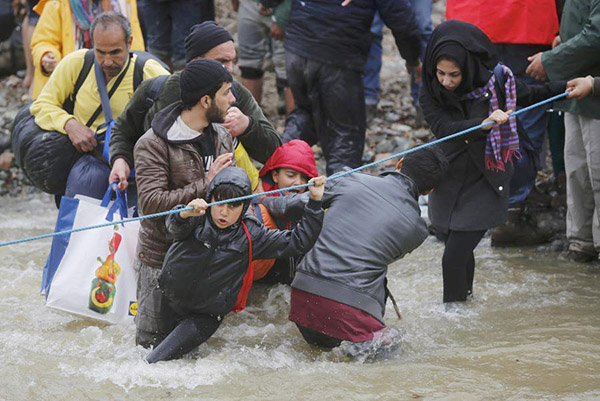 |
|
Migrants wade across a river near the Greek-Macedonian border, west of the the village of Idomeni, Greece, March 14, 2016. [Photo/Agencies] |
The mass of humanity fleeing war-torn Syria and other Middle East countries in search of shelter in European countries is looking, literally, into a dark tunnel without even a hint of the proverbial light at the end.
The adult refugees, perhaps, can fathom why they are being punished; some even might be blaming it on fate. Not the children, who like their peers anywhere in the world, enjoyed the comfort of home, and the affection of their parents until the mindless mayhem orchestrated by the knowledge-driven, justice-obsessed, self-appointed guardians of democracy descended on them. The curse of this pantheon of living gods fell on these children like fire from the heavens, leaving them no option but to keep moving in search of an ever-evasive roof over their head.
Now the watchdogs of democracy are out to broker a deal. The European Union leaders claim to be on the verge of finding a "unified solution to the refugee crisis" with their fellow NATO member Turkey - they expect a decision on Friday. As the EU and Turkish leaders meet, however, the roads from one EU country to another, supposed to be open "highways", remain closed to the hungry, desperate men, women and children forced to become refugees through no fault of their own.
If you thought all the EU countries have a similar solution in mind and, hence, are holding talks with Turkey, then the news coming out of Europe has to be hogwash. Bulgaria says an EU-Turkey deal on "one in, one out" - which will, for every Syrian refugee settled in Europe, see one Syrian refugee returned to Turkey from the Greek islands - could make it the next transit country for thousands more refugees arriving in Europe.
The chinks in the EU's economic and social armor were exposed by the sovereign debt crisis. The worst to suffer from the chasm in the EU was Greece. It was left to lick its economic wounds for itself. The refugee crisis has widened that chasm.
That is precisely why the EU-Turkey deal should not be likened to "providence tempers the wind to the shorn lamb". The shorn lamb, that is to say Greece, will have to ward off the cold, biting winds on its own. It is already overwhelmed by the influx of refugees, not least because of its appalling economic state (thanks to EU bosses), and has no way of blocking the flow of refuges like other EU countries have done, for they come from the sea.
Most of the 28 EU countries heartily backed the US plans for Libya, Syria and other Middle East countries by default, because they are part of NATO as well, "inspired" and enthused as they were by the "Arab Spring". Had they resisted the US and NATO moves, the Middle East would have been different today. To begin with, the civil war in Syria would not have dragged on and the Islamic State would not have emerged as a pulverizing threat - and thousands of people would not have fled the country for the "safety" of Europe.
And what do US politicians, the "guardian angels" of peace and democracy who are so adept at creating socio-political messes and humanitarian crises without having any intention of clearing them up, do? They build more castles in the air, debate and dissect the US presidential race, praise one candidate and lambast another, and its president blames the imbroglio in Libya on European heads of state. Looking for inward-looking, exclusivist leaders? Look no further than American politicians.
Lest we forget, the Barack Obama administration has declared the Islamic State is "guilty of genocide for the wanton killing of Christians, Yazidis and Shiite Muslims". As if that will stop the IS from perpetrating more atrocities.
A recent CNN report said the cost of rebuilding Syria, according to moderate estimates, would be $300 billion. So that is what the intervention in Syria and other Middle East countries was all about. Shock doctrine, as Naomi Klein has put it, or creative destruction.
Peace and democracy are just a ruse. Refuges, indeed humanity, can go to ...
The author is a senior editor with China Daily. [email protected]

I’ve lived in China for quite a considerable time including my graduate school years, travelled and worked in a few cities and still choose my destination taking into consideration the density of smog or PM2.5 particulate matter in the region.
